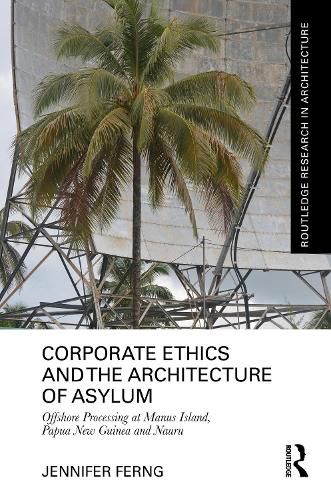Readings Newsletter
Become a Readings Member to make your shopping experience even easier.
Sign in or sign up for free!
You’re not far away from qualifying for FREE standard shipping within Australia
You’ve qualified for FREE standard shipping within Australia
The cart is loading…






Corporate Ethics and the Architecture of Asylum engages innovative perspectives to understand our contemporary crisis of forced displacement and detention practices in the Pacific.
Multinational contractors responsible for the construction and maintenance of regional processing centres in Papua New Guinea and Nauru have flourished as powerful historical actors, exerting global dominance over the lives of asylum seekers wishing to come to Australia. Transitioning from the policeman or security guard toward the subject of the asylum seeker, this book contends that entanglements between architecture and law represent important epistemic models to interrogate how asylum can be understood and reconceptualized. Proposing diverse forms of visual and textual evidence, asylum is repositioned as a dynamic, ever-changing countermeasure against xenophobic sentiments around offshore processing. Over six chapters, Corporate Ethics examines how the regional processing centres of Manus Island and Nauru are deeply connected to the intellectual discourses of care, environmental precarity, human rights, and sovereignty. From Rembrandt's De Nachtwacht or Night Watch (1642) to recent advancements in artificial intelligence and legal testimonies, picturing the future of asylum serves as a critical tool to resist state authoritarianism and the rise of corporate malfeasance in the built environment.
This book will be of interest to researchers and students of humanitarian architecture, architectural history and Asia Pacific politics.
$9.00 standard shipping within Australia
FREE standard shipping within Australia for orders over $100.00
Express & International shipping calculated at checkout
Corporate Ethics and the Architecture of Asylum engages innovative perspectives to understand our contemporary crisis of forced displacement and detention practices in the Pacific.
Multinational contractors responsible for the construction and maintenance of regional processing centres in Papua New Guinea and Nauru have flourished as powerful historical actors, exerting global dominance over the lives of asylum seekers wishing to come to Australia. Transitioning from the policeman or security guard toward the subject of the asylum seeker, this book contends that entanglements between architecture and law represent important epistemic models to interrogate how asylum can be understood and reconceptualized. Proposing diverse forms of visual and textual evidence, asylum is repositioned as a dynamic, ever-changing countermeasure against xenophobic sentiments around offshore processing. Over six chapters, Corporate Ethics examines how the regional processing centres of Manus Island and Nauru are deeply connected to the intellectual discourses of care, environmental precarity, human rights, and sovereignty. From Rembrandt's De Nachtwacht or Night Watch (1642) to recent advancements in artificial intelligence and legal testimonies, picturing the future of asylum serves as a critical tool to resist state authoritarianism and the rise of corporate malfeasance in the built environment.
This book will be of interest to researchers and students of humanitarian architecture, architectural history and Asia Pacific politics.